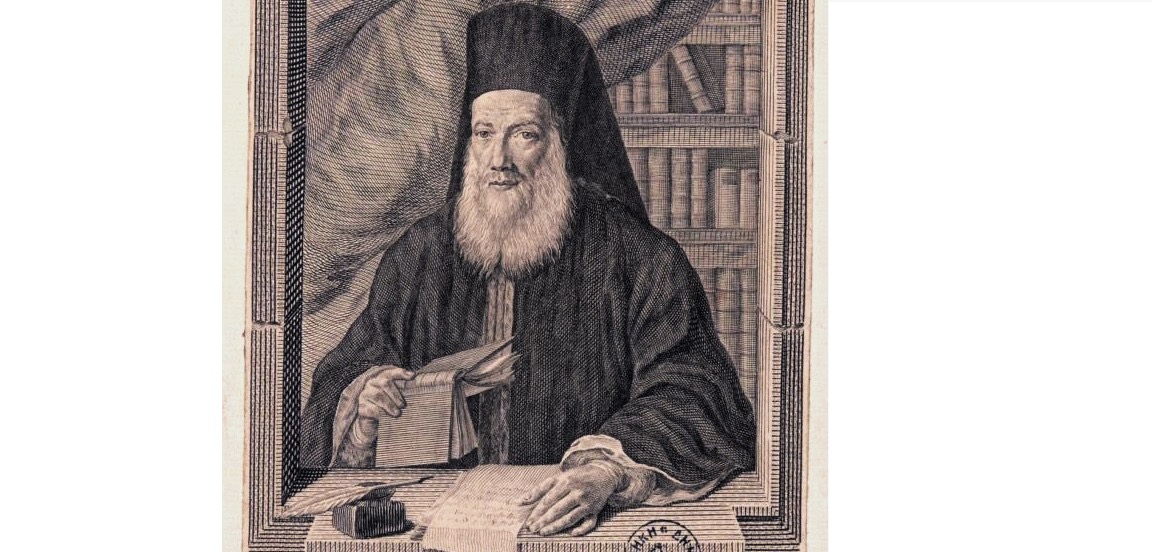
Tolerance, which the Latin call Tolerantiam, and we might accurately name Anexithriskia, is nothing but the clement and gentle disposition of a pious soul […]
Eugenios Voulgaris
Eugenios Voulgaris was born in 1716 in Corfu, as Eleftherios Voulgaris. From his schooling in Philosophy, we have his autograph student notebook, dating from 1731, which contains the introduction by Georgios Sougdouris to Aristotle’s Logic.Throughout his teachings in various schools such as the Maroutsaia School in Ioannina, the School of Kozani, the Athonias Academy and the Patriarchal School of Constantinople, Voulgaris attempted to introduce the principles of modern Philosophy to his educational programme. In 1740-1750, he compiled an epitome of the work An Essay concerning human understanding by John Locke, titled «Ὑποτύπωσις ἢ ὑπόμνημα φιλοσοφικὸν περὶ τοῦ κατὰ ἄνθρωπον νοῦ ἐκ τοῦ Ἄγγλου Λωκίου» [Philosophical memoire on the human understanding based on Englishman Locke]. It was never published and remains a manuscript in the National Library of Greece. An English-language epitome of the work Essay by Locke was translated and published anonymously in Venice in 1796 by friar Ioannis Litinos from Zante, titled Ἐγχειρίδιον μεταφυσικο-διαλεκτικόν [Metaphysical-dialectical handbook]. His Λογικὴ [Logic] was the basic textbook of Philosophy used by Voulgaris. It was printed in 1766 during his stay in Leipzig and contains references to the works by Locke and Voltaire, among others.
In 1768, Voulgaris published his translation of the work Essai historique et critique sur les dissensions des églises de Pologne by Voltaire titled Περὶ τῶν διχονοιῶν τῶν ἐν ταῖς ἐκκλησίαις τῆς Πολονίας δοκίμιον ἱστορικὸν καὶ κριτικόν [Historical and critical essay concerning disunity in the Church of Poland]. The same publication includes the essay Σχεδίασμα περὶ τῆς ἀνεξιθρησκείας, ἤτοι περὶ τῆς ἀνοχῆς τῶν ἑτεροθρήσκων [Design for religious tolerance, or The tolerance of heteroreligious people], where he introduced the neologism “anexithriskia”. This work is also saved in manuscript form, though with a small yet significant difference in the title: «Σχεδίασμα περὶ τῆς ἀνεξιθρησκείας, ἤτοι περὶ τῆς εὐλόγου ἀνοχῆς τῶν ἑτεροθρήσκων» [Design for religious tolerance, or The fair tolerance of heteroreligious people].
Yet, there was also criticism of the ideas of the Enlightenment. Among the later writings by Voulgaris, one of his letters, dating from 1790, includes the following: “a Voltaire, a Rousseau […] among the great and disrespected names”. Furthermore, the work Χριστιανικὴ Ἀπολογία [Christian Apology] , published anonymously in Constantinople in 1798, attributed to Athanasios Parios, includes an attack against Voltaire, among others, as “despicable, foul, godless, lunatic, reviled, accursed […]”.




